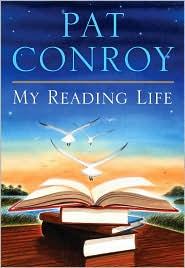t o d d w a r n e r reviewed My Reading Life by Bob Carr
Pat Conroy's love letter to the written word
4 stars
A love letter to the written word, My Reading Life is a window into the development of a reader, a writer, and ultimately a person. This anthology of personal narratives is so full of warmth and bitterness and self-reflection and wishful thinking and love for all the books and people in his life. The book also conveys a palpable throughline of sadness. Conroy struggled with sadness throughout his life, which is subtly reflected in the stories of his life.
I loved LOVED this book. I have to let it simmer in my brain for awhile. It may eventually become a 5-star book for me (only reserved for favorites). But for now, 4-stars for a book I truly loved.
In closing, I share a couple of passages I loved taken from two chapters toward the end of the book.
From chapter Why I Write, p304 - on the topic of …
A love letter to the written word, My Reading Life is a window into the development of a reader, a writer, and ultimately a person. This anthology of personal narratives is so full of warmth and bitterness and self-reflection and wishful thinking and love for all the books and people in his life. The book also conveys a palpable throughline of sadness. Conroy struggled with sadness throughout his life, which is subtly reflected in the stories of his life.
I loved LOVED this book. I have to let it simmer in my brain for awhile. It may eventually become a 5-star book for me (only reserved for favorites). But for now, 4-stars for a book I truly loved.
In closing, I share a couple of passages I loved taken from two chapters toward the end of the book.
From chapter Why I Write, p304 - on the topic of good writing:
Good writing is the hardest form of thinking. It involves the agony of turning profoundly difficult thoughts into lucid form, then forcing them into the tight-fitting uniform of language, making them visible and clear. If the writing is good, then the result seems effortless and inevitable. But when you want to say something life-changing or ineffable in a single sentence, you face both the limitations of the sentence itself and the extent of your own talent. When you come close to succeeding, when the words pour out of you just right, you understand that these sentences are all part of a river flowing out of your own distant, hidden ranges, and all words become the dissolving snow that feeds your mountain streams forever. The language locks itself in the icy slopes of our own high passes, and it is up to us, the writers, to melt the glaciers within us. When these glaciers break off, we get to call them novels, the changelings of our burning spirits, our life's work.
From chapter The City, p329-330 - on the topic of "what a good book does":
I cheer when a writer stops me in my tracks, forces me to go back and read a sentence again and again, and I find myself thunderstruck, grateful the way readers always are when a writer takes the time to put them on the floor. That's what a good book does—it puts readers on their knees. It makes you want to believe in a world you just read about—the one that will make you feel different about the world you thought you lived in, the world that will never be the same.

